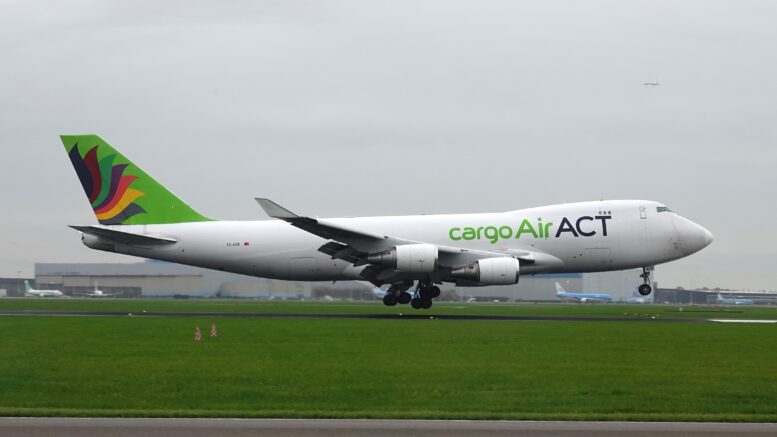Aviation News
Cargo Plane Overshoots Runway at Hong Kong Airport, Killing Two Ground Workers
The tragic accident at Hong Kong International Airport shocked the aviation community. A cargo plane overshot the runway, killing two ground workers and injuring others. The Boeing 747-400 freighter involved is now under investigation. Authorities are examining possible weather or braking issues during landing.
Incident Overview
The Boeing 747-400 freighter operated under a wet-lease agreement for Emirates SkyCargo, showing the complexity of cargo operations. The crash caused two deaths and several injuries, raising urgent concerns about safety procedures.
Flight Details
Emirates SkyCargo flight EK9788 departed from Al Maktoum International Airport in Dubai. It carried a large cargo load and veered off the runway during landing at Hong Kong International Airport.
Timing and Location
The crash happened around 3:53 a.m. local time. Emergency crews arrived quickly as airport operations paused. The aircraft stopped in the sea after striking a ground service vehicle.
The proximity to the sea and ground workers nearby increased the risk of fatalities and injuries. The early morning timing and low visibility may have contributed to the accident, making landings under such conditions challenging.
Initial Responses
Emergency services reacted within minutes. Firefighters and paramedics reached the scene fast. The airport’s emergency team coordinated with local authorities to manage the situation effectively.
Emergency Services Deployment
The quick deployment of emergency services helped save lives. They rescued four workers from the wreckage and transported them to the hospital. Their rapid response prevented additional casualties.
Eyewitness Accounts
Witnesses described the impact as intense. They heard the crash and explosion across the airport. The scene appeared chaotic and devastating, with debris scattered across the runway.
Eyewitnesses also saw the ground service vehicle pushed into the water by the crashing aircraft. Their statements will help investigators reconstruct the sequence of events and identify the cause of the crash.
Casualties and Injuries
The crash killed two ground workers and injured several others.
Fatalities
The two victims died when the aircraft hit a ground service vehicle and pushed it into the water. The workers could not escape in time.
Injured Personnel
Four others were rescued and hospitalized. Authorities continue to monitor their condition and provide medical care and support.
Aircraft and Operations
The aircraft was a Boeing 747-400 freighter, known for its heavy cargo capacity and long-range capabilities. It operated under a wet-lease agreement for Emirates SkyCargo, showing how global cargo operations often involve multiple partners.
Aircraft Specifications
The Boeing 747-400 freighter has a maximum takeoff weight of over 400,000 kg and can carry up to 120,000 kg of payload. These specifications highlight its design for large-scale cargo transport.
Lease and Operational Details
Emirates SkyCargo leased the plane, a common practice that lets airlines expand operations without owning every aircraft. The wet-lease agreement between Air ACT and Emirates SkyCargo includes the aircraft, crew, and maintenance services. Investigators must examine the roles and responsibilities of both parties to identify what went wrong. Such arrangements require close cooperation between airlines, regulators, and maintenance providers to prevent future incidents.
Investigation Proceedings
Authorities are conducting a full investigation with several agencies involved. They are reviewing flight data, weather reports, and pilot actions to understand the cause.
Government Investigations
The Civil Aviation Department of Hong Kong leads the investigation with support from Turkish and Emirati aviation authorities. This ensures a comprehensive, international review.
Preliminary Findings
Early analysis points to possible weather or braking issues as key factors in the runway excursion. Investigators are expected to release a detailed report soon, outlining the sequence of events, pilot decisions, and aircraft performance. They will also analyze flight recorder data and interview crew and ground staff to gather evidence.
Safety Implications
The accident highlights the need for stronger safety measures in cargo flight operations. The ongoing investigation will likely uncover specific causes and lead to improved protocols.
Ground Coordination and Protocols
Investigators are reviewing ground coordination procedures at Hong Kong International Airport to see if communication or procedural lapses contributed to the accident.
Airport Safety Measures
Hong Kong International Airport remains one of the world’s busiest cargo hubs. Runway design, lighting, and emergency response systems are key safety components. Authorities will examine whether these systems performed effectively or need upgrades. Frequent inspections and continuous staff training remain essential to avoid similar tragedies.
Conclusion
This cargo plane accident at Hong Kong Airport claimed the lives of two ground workers and injured several others. Investigators continue to analyze the causes to strengthen future safety standards. The tragedy underscores the importance of strict safety procedures to protect both flight and ground personnel.

